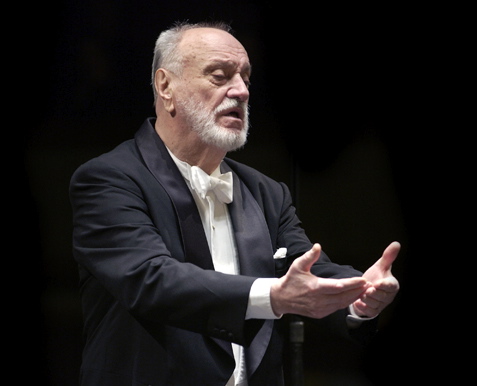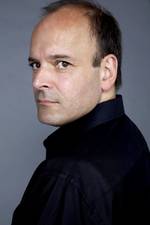Masur, CSO scale the heights with Bruckner

Bruckner is not a composer for the 21st century.
The breadth and length of his symphonies, the long lines, repetition, and moderate tempos can be water torture for skeptics and even difficult to assimilate for non-skeptics in an age of short attention spans and electronic instant gratification.
In his first Chicago Symphony Orchestra appearance in eight years, Kurt Masur lifted the veil on the myriad mysteries of Bruckner’s epic sonic cathedrals Thursday night in a remarkable performance of the Austrian composer’s Symphony No. 4 that stands as one of the highlights of the CSO season.
At 83, Masur has outlived Bruckner by more than a decade, and his long experience with the composer was manifest in his nuanced, masterful direction and complete understanding of this difficult score.
Clad in dark brown Nehru jacket like a Zen Buddhist priest, the German conductor opted for the 1878-1880 edition of this much-revised symphony, making its fitful oddities emerge as virtues.
As one would expect from the CSO, the brass chorales were gleaming and resplendent, Masur ensuring scrupulous blending and an organic flow.
Yet what was so striking in this memorable Bruckner performance was the widely terraced dynamics and the concentration of the quiet moments. Even with Masur’s spacious approach, there were no longeurs or any sense of dawdling. The conductor, leading sans baton or score, clearly had the work’s architecture in hand and the end in his sights. Still there was plenty to see and hear along the expansive journey with Masur and the CSO giving us the rustic Austrian countryside as well as the soaring mountain views.
Masur brought a bracing transparency to this familiar score that made one listen to it with fresh ears, from the mystery of the opening bars to his artful pacing of the long first movement and his moulding of the noble theme of the Andante. Time and again, the conductor underlined the delicacy and hushed tenderness of the string writing in the “slow bits” often brusquely raced over by lesser podium hands on their way to the next brassy chorale outburst.
The hunting motif of the Scherzo had sure impact, and the pastoral songful lilt of the contrasting trio section could have charmed the Austrian avians out of the trees. Masur’s patient style paid off in a coda that really felt like the end of an enriching journey, majestic in tone without ever crossing the line into sonic bombast.
Clearly inspired by their elder statesman maestro, the orchestra played gloriously even by their standards. Daniel Gingrich’s atmospheric horn solos were a model of technical security and elegance, as was the playing of the rest of his brass colleagues. Woodwinds provided equally evocative moments, from Mathieu Dufour and John Bruce Yeh in particular. Yet it was the strings that really shined Thursday night with agile and beautifully hushed playing of a Mozartian refinement.
There is only one repeat performance of this program and you owe it to yourself to hear this memorable Bruckner on Saturday night.

The first half proved more variable. Louis Lortie is a polished musician with an admirable technique but I’ve found him a pallid presence in concert without much individuality. So it proved again Thursday with Mozart’s Piano Concerto No. 23, which opened the program.
Chicagoans have been spoilt for Mozart pianism in recent years with such artists as Mitsuko Uchida and Paul Lewis making regular appearances.
Lortie’s opening movement quickly settled into a kind of bland efficiency, unvaried in dynamics or detailing. The Canadian pianist’s Adagio was poised and attentive yet all on the surface with little expressive nuance. The concluding Allegro went better–it should as one of Mozart’s most effervescent inspirations–but even here it was the CSO winds more than the soloist who seemed to engage with the music’s wit and energy under Masur’s sturdy accompaniment.
The program will be repeated 8 p.m. Saturday. cso.org; 313-294-3000.
Posted in Performances



Posted Apr 03, 2011 at 8:55 pm by Olivier
what an amazing performance! Bruckner conducted by Bruckner.
Master Masur was standing in the heart of the orchestra like a magistral old oak. A piece of history in front of us.
Chapeau bas, master Masur!
bravo to Mathieu Dufour and John Bruce Yeh. The CSO at its best.
We all hope that one day Mutti will stand up to reach the same level.
Lortie, who is a great pianist, was definitely too shy…
Posted Apr 04, 2011 at 1:33 pm by Strabo
Maybe if Mutti actually makes it to a concert this season…
I keep waiting to get the word that he’s canceled conducting the orchestra in NYC and that Dutoit or Boulez is subbing for him.
Posted Apr 05, 2011 at 7:26 pm by Ken
Saturday night’s concert was truly extraordinary, for the reasons so eloquently stated in this fine, insightful review. Kurt Masur may not pass this way again; we were blessed to have heard him craft this sublime performance.
Posted Apr 06, 2011 at 11:52 pm by Marc
Full agreement with all of the above.
Saturday’s performance was also breathtaking. So glad I was there.
Posted Apr 07, 2011 at 7:33 pm by Bob
Masur’s performance with the CSO of Bruckner 4 was quite simply one of the greatest performances of Bruckner I have ever heard, and I am a fan of Haitink. But Masur’s conducting revealed more of Bruckner’s music than any other performance I know. I have written the CSO that this was a performance to be treasured (for all the reasons given in the above review), and not allowed to disappear. So I hope it was recorded and that the CSO figures out some way to make it available. The above review makes clear why it should so. It matches and confirms my own perception of the performance.
Posted Apr 20, 2011 at 8:50 pm by Daniel
I have never heard Bruckner’s Fourth performed live before. I was amazed at the CSO brass in the first movement, but I was disappointed that the first movement seemed more powerful than the finale of the symphony, which didn’t quite seem loud enough to me in relation to parts of the first movement. Perhaps this is due more to Bruckner’s orchestration or even the version of the symphony that was performed than it was to Masur’s interpretation. Except for the ending, I was impressed with the peformance.